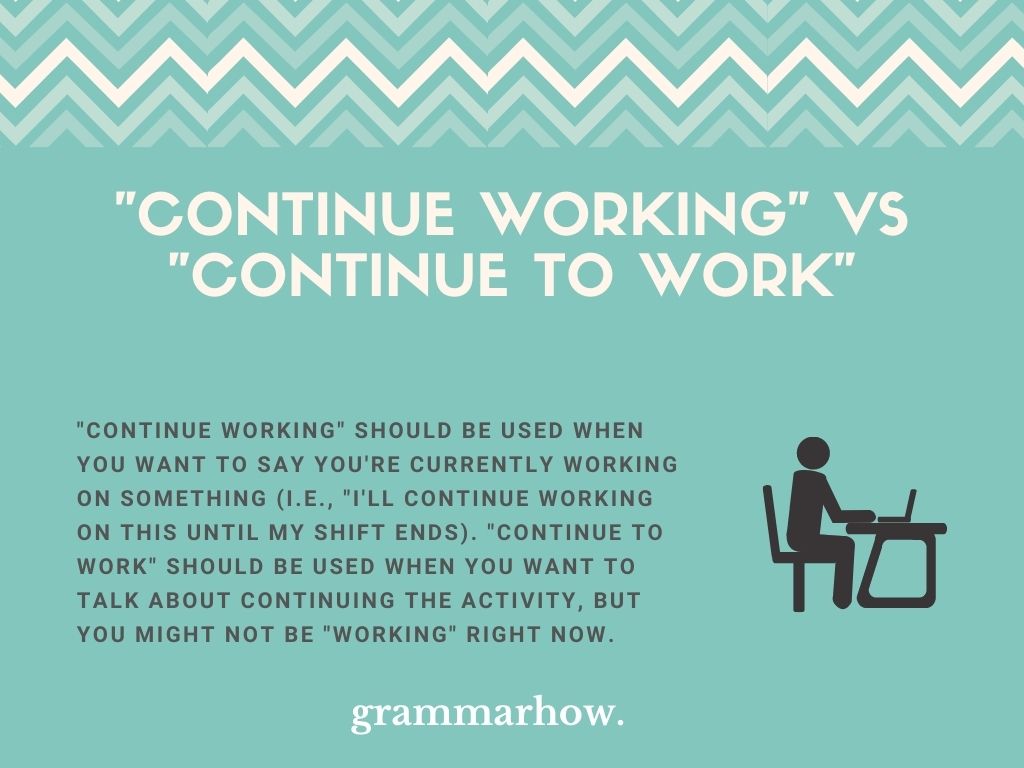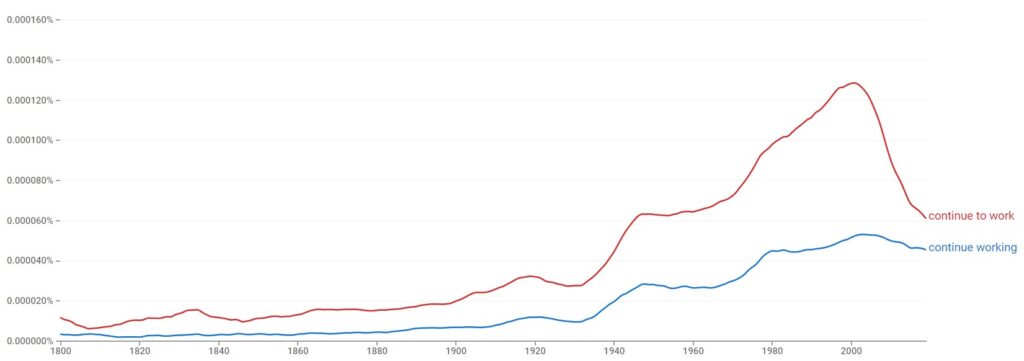Served as and Continues to Be
Getting tenses correct is an essential part of understanding and using English. There are multiple present tense ideas when we look at phrases like "continue working" and "continue to work." So, let's look at how to use both in this article.
What Is The Difference Between "Continue Working" And "Continue To Work"?
"Continue working" should be used when you want to say you're currently working on something (i.e., "I'll continue working on this until my shift ends). "Continue to work" should be used when you want to talk about continuing the activity, but you might not be "working" right now.

"Continue working" is the present continuous tense form of "to work," while "continue to work" is the infinitive form. Both are interchangeable with each other and mostly come down to personal preference with when you use which one.
Is "Continue Working" Or "Continue To Work" Used The Most?
Let's look at the two options and see which one gets more use (in the sense that they're interchangeable).
Looking at this graph, we can see that "continue to work" has always been the more popular choice. However, the difference between the two has always been slight.

The two words are great to use synonymously, and many native speakers won't mind whichever variation you use. While they both have very slight differences in their overall meaning, no native speaker will mind if you decide to use one over the other.
When Should I Use "Continue" Vs "Continues"?
When we use "continue" in these phrases, it adds an interesting flair to the rest of the phrase. "Continue" is a verb in itself, just like "working" or "to work" are. That means we're using a phrase with two verbs in it.
We use "continue" when we're talking in the present with the first person singular (I), the first person plural (we), or the third person plural (they, you). We use "continues" when we're talking in the present with the third person singular (he, she, it).
Generally, when we use "continue" in any form, it acts as a helping verb to encourage the present continuous or infinitive form of "work" to be included. Let's look at some examples of when to use it.
- I continue to work when I'm asked.
- We continue working because it's part of the contract.
- He continues to work when he feels like it.
- She continues working because the boss is expecting her to finish.
7 Examples Of How To Use "Continue Working" In A Sentence
Now let's narrow down the two forms a little better. We'll start by looking at "continue working." Remember, the two forms are used synonymously for the most part. However, there is one slight difference that we'll mention.
Continue working is mostly used when we're talking about an activity that we're currently still doing. That means we're currently working and looking to continue until a certain point.
- I will continue working until I'm told otherwise.
- They have to continue working because they're behind on their deadlines.
- He must continue working when we're gone; otherwise, he'll be kept back a grade.
- You continue working even when I don't ask you to, and I'm grateful for that.
- Must we continue working while the boss is away?
- I continue working because I like to impress my superiors.
- They'll continue working until their lunch break.
As you can see, we generally refer to things that are presently happening when we use the phrase "continue working." It's a little more specific than the alternative "continue to work."
7 Examples Of How To Use "Continue To Work" In A Sentence
Let's look at the more open-ended option. We're not limited with how we use this one, and it can work in many sentences. Generally, we want to talk about when we want to continue to work, even if we're not currently working.
Continue to work is used when saying we want to continue to work, even if we're not currently taking part in a work-based activity. It can encourage us to start working, as we're talking in the present tense.
- I will continue to work when it suits me best.
- You will continue to work when the time comes.
- They continue to work as soon as they're asked.
- We continue to work to make sure we hit the deadlines required.
- While the boss is out, he will only continue to work when he's eaten his lunch.
- Shall we continue to work now or wait until later?
- They can't continue to work until you've given them the all-clear.
We don't always have to refer to a present continuation of work when we use "to work" as the verb.
"Continue Working" And "Continue To Work" – Synonyms
Let's look at some alternatives we can use to help us if we're struggling with the differences between the two. These are a great way to build up your understanding and vocabulary without worrying about getting the forms or tenses wrong.
- Proceed
We don't always have to talk about working when we say "proceed," but it works well as a synonym.
- Keep on working
"Keep on" is another way of saying "continue" and works well here.
- Keep running
We can "keep" to replace "continue" while also "run" to replace "work." Both words work together, though this isn't a common saying in this context.
Is It Ever Correct To Use "Continuing To Work"?
Sometimes, we can mix the forms up even further and come up with some difficult language. However, that doesn't always mean our forms are correct, so it's best to check them.
"Continuing to work" is correct when we're talking about the future tense, where we want to continue to work at a point in the future. It usually is accompanied by the helping verbs "will be."
- We will be continuing to work when you tell us to.
- I will be continuing to work tomorrow morning.
Is It Ever Correct To Use "Continuing Working"?
Although it works when we use "to work" at the end, the same can't be said for "working."
There are no instances where "continuing working" is grammatically correct. We can't use the future continuous form in this sense, so we should instead refer to the phrase above this section.
You may also like: 10 Motivating Ways To Say "Keep Up The Good Work"
Source: https://grammarhow.com/continue-working-vs-continue-to-work/
0 Response to "Served as and Continues to Be"
Post a Comment